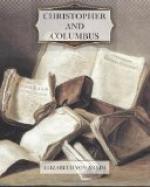The twins for their part eyed him. Not only did his rolling jaws fascinate them, but the things he was saying seemed to them quaint.
“But we wanted to come,” said Anna-Rose, after a pause.
“Of course. Does you credit,” said the driver.
The twins thought this over.
The bright station lights shone on their faces, which stood out very white in the black setting of their best mourning. Before getting to Los Angeles they had dressed themselves carefully in what Anna-Felicitas called their favourable-impression-on-arrival garments,—those garments Aunt Alice had bought for them on their mother’s death, expressing the wave of sympathy in which she found herself momentarily engulfed by going to a very good and expensive dressmaker; and in the black perfection of these clothes the twins looked like two well-got-up and very attractive young crows. These were the clothes they had put on on leaving the ship, and had been so obviously admired in, to the uneasiness of Mr. Twist, by the public; it was in these clothes that they had arrived within range of Mr. Sack’s distracted but still appreciative vision, and in them that they later roused the suspicions and dislike of Mrs. Twist. It was in these clothes that they were now about to start what they hoped would be a lasting friendship with the Delloggs, and remembering they had them on they decided that perhaps it wasn’t only sun and oranges making the taxi-driver so attentive, but also the effect on him of their grown-up and awe-inspiring hats.
This was confirmed by what he said next. “I guess you’re old friends, then,” he remarked, after a period of reflective jaw-rolling. “Must be, to come all that way.”
“Well—not exactly,” said Anna-Rose, divided between her respect for truth and her gratification at being thought old enough to be somebody’s old friend.
“You see,” explained Anna-Felicitas, who was never divided in her respect for truth, “we’re not particularly old anything.”
The driver in his turn thought this over, and finding he had no observations he wished to make on it he let it pass, and said, “You’ll miss Mr. Dellogg.”
“Oh?” said Anna-Rose, pricking up her ears, “Shall we?”
“We don’t mind missing Mr. Dellogg,” said Anna-Felicitas. “It’s Mrs. Dellogg we wouldn’t like to miss.”
The driver looked puzzled.
“Yes—that would be too awful,” said Anna-Rose, who didn’t want a repetition of the Sack dilemma. “You did say,” she asked anxiously, “didn’t you, that we were going to miss Mr. Dellogg?”
The driver, looking first at one of them and then at the other, said, “Well, and who wouldn’t?”
And this answer seemed so odd to the twins that they could only as they stared at him suppose it was some recondite form of American slang, provided with its own particular repartee which, being unacquainted with the language, they were not in a position to supply. Perhaps, they thought, it was of the same order of mysterious idioms as in England such sentences as I don’t think, and Not half,—forms of speech whose exact meaning and proper use had never been mastered by them.




